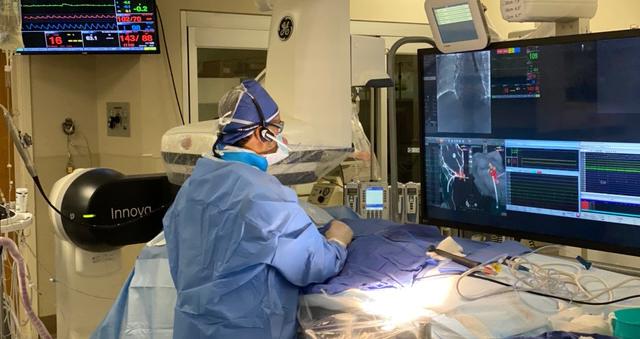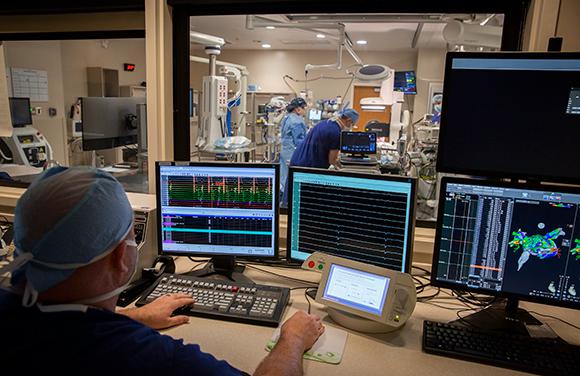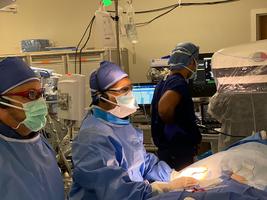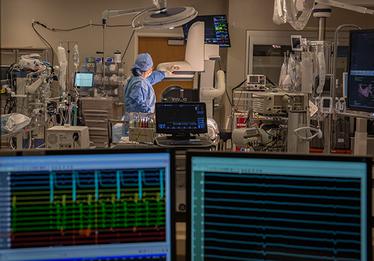Electrophysiology Services

Signs and Symptoms of Abnormal Heart Beat
Although quite common, arrhythmia, or abnormal heartbeat, can be a serious condition and cause a number of symptoms that may lead to further complications.
- Chest pain
- Fainting
- Lightheadedness
- Shortness of breath
- Skipping or fluttering in the chest
Preparing for Electrophysiology Assessments
For effective analysis with faster relief and recovery, we recommend taking special steps to prepare for and recover from the minimally invasive assessments we provide.
Before Your Procedure
Report any allergies you have and all medications you are taking to your doctor. Tell your doctor if you are pregnant, taking aspirin or taking blood thinners.
Do not eat or drink anything at least 8 hours before your procedure. With your doctor’s permission, you may take your medications with small sips of water.
During Your Procedure
In most instances you will be completely asleep unless a lesser degree of sedation and anesthesia is required or agreed upon based on medical reasons and your personal preferences.
Electrophysiology assessments and ablations are performed in a special area of the hospital, which is intentionally kept cool. In this area you will see an X-ray camera and monitors that look like TV screens. These monitors let your doctor see your heart and the location of the different tools and catheters during the procedure. Multiple ECG pads will be placed on your chest to check your heart.
The area where the electrophysiology wires, (catheters) are inserted will be cleaned and shaved. A medium sized IV called an introducer sheath will be placed in the vein or artery. Through this sheath, the doctor will place one or more special catheters into the heart. These catheters record and send electrical signals to the heart. The signals the doctor sends may stimulate your heart to induce the arrhythmias that caused your symptoms. An arrhythmia made during the procedure will often stop by itself. If it persists then the doctor will use other techniques to stop it, and in some instances the staff may deliver electrical energy to your heart to restore normal rhythm. Because you are sedated, you will not be aware of any of this, unless being awake is agreed upon in advance.
After the Procedure
The hardware will all be removed. Pressure will be used to close the opening in the vein and a dressing will be placed over the insertion site. You will be taken to the recovery area or your room by cart.
How soon after the procedure you may eat or drink depends upon your condition. You may need to lie on your back with your legs straight for about 4-6 hours to prevent bleeding from the insertion site. During that time, do not bend or lift the leg where the catheters were inserted. To relieve stiffness, you may move your foot or wiggle your toes. A nurse will check often to see if there is bleeding. If you notice bleeding or pain at the site, notify your nurse immediately.
Depending on the results, you may be sent home several hours after the procedure, or the next day. Some patients may need to stay for more tests or procedures. When it’s time to go home you will need to have a friend or family member drive you.
Returning Home
Once you return home, we recommend limiting your activity during the first couple of days. You can move about, but do not strain or lift heavy objects. Ask your doctor when you can return to your normal activities, and whether there are things you should refrain from doing.
It’s common for a bruise or small lump under the skin to appear near the insertion site. It should disappear within 3 to 4 weeks. If the insertion site becomes painful or warm to the touch, the bruising or swelling increases or you develop a fever over 101.5F, call your nurse.
On the Road to Recovery
Your doctor may also suggest that you change some of your habits. While some risk factors, such as age and family history, cannot be controlled, making healthy lifestyle changes can help prevent arrhythmias, a future heart attack, stroke or other health problems.
- Give up tobacco
- Control high blood pressure (with diet, exercise and medication-if prescribed)
- Control high blood cholesterol (with a low-fat diet, exercise and medication-if prescribed)
- If diabetic, control blood sugar
- Exercise regularly, after the insertion sites have fully healed
- Maintain a healthy weight
- Learn healthy ways to manage stress
Treatments and Procedures
After your electrophysiology assessment, our specialized heart care providers will decide if your arrhythmia requires treatment, and if so, which option is best. Treatments may be done at the same time as your assessment, using minimally invasive techniques and technology that help you recover and return to a normal life, faster.
- Catheter Ablation: A technique that uses special catheters to destroy the abnormal tissue causing arrhythmia.
- Implantable Cardioverter Defibrillator (ICD): A small device that is placed under the skin over the left or right chest to prevent development of life-threatening arrhythmias quickly. This procedure requires anesthesia and may be performed in the room your study was done, or in surgery.
- Medications: These may change the electrical signals within the heart, restore a normal rhythm or prevent future arrhythmias.
- Pacemaker: A small device that is placed under the skin over the left or right chest to prevent your heart from beating too slowly. This procedure requires anesthesia and may be performed in the room your study was done, or in surgery.
Our Doctors
As members of the community themselves, our physicians are dedicated to making world-class cardiac care available to our neighbors here in southeastern Wisconsin and northern Illinois. Our expert electrophysiologist, Dr. Choudhuri, helps ensure an accurate diagnosis to provide the best possible treatment for your condition.

Location(s)
I thank God for Dr. Choudhuri. He fixed me up. I go outside on my porch early every morning, and I just look up at the sky and say, ‘Thank you. I’ve got another day.

Phone Numbers
-
Cardiac Services
262-577-8497
Electrophysiology Services
Choosing us for your heart care means a personable road to recovery. Our team provides the expertise and minimally invasive care you expect from an academic hospital, right here close to home.


